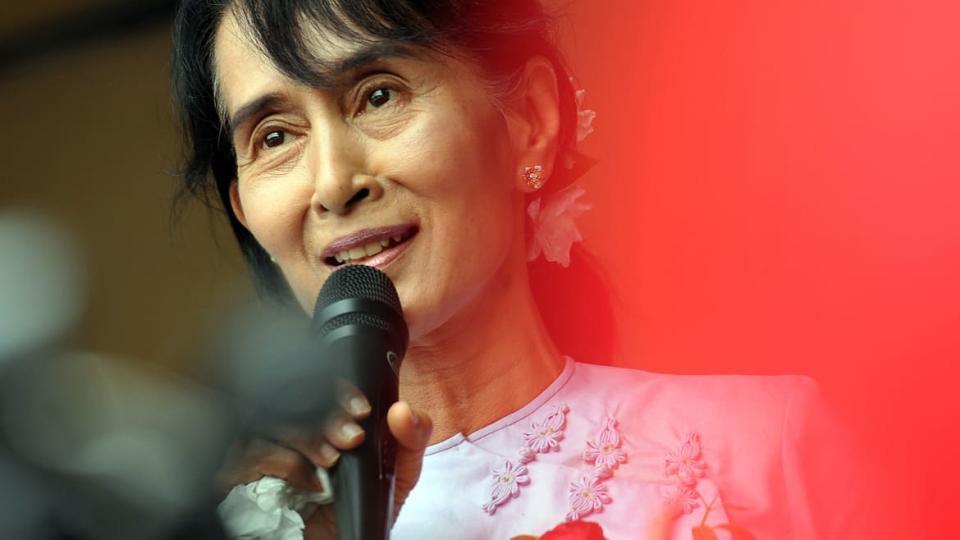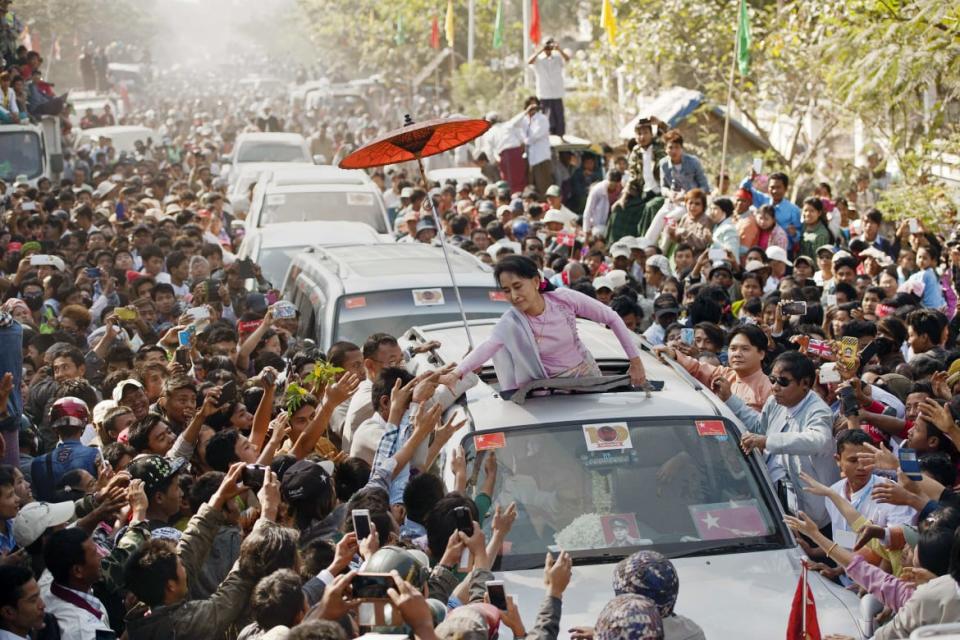Farcical Trial of Disgraced Aung San Suu Kyi Restores Her Power as the Legend of the Revolution

MAE SOT, Thailand—Refugees, militants, and peace activists who braved the Myanmar military’s brutal crackdown have greeted a two-year prison sentence for their embattled leader, Aung San Suu Kyi, with defiance, resolve, and even chuckles. They insisted in interviews along a border zone divided by barbed wire, rice fields, and muddy waters that their own blood-soaked “revolution” will free not only Suu Kyi one day, but also will liberate all of Myanmar’s political prisoners, estimated by the United Nations to number near to or over 10,000.
Suu Kyi, who won the 1991 Nobel Peace Prize for her courageous leadership during the 1988 democratic uprising when the military mowed down hundreds of demonstrators near the doorstep of the U.S. Embassy in Yangon (then Rangoon), remains at the heart of one of the world’s most resilient freedom movements despite criticism that she has been at times arrogant towards her minions and dismissive of the struggle of Myanmar’s persecuted Rohingya minority—going so far as to defend the regime against allegations of genocide at a United Nations court. Even as the junta repeatedly offered—over three decades—an easy exit ramp and a chance for her to abandon her struggle, Suu Kyi’s willingness to remain in military captivity—even when that means her silence—has only strengthened support for her National League for Democracy and the National Unity Government in exile.
Myanmar has been wrapped in a time warp since those torch-lit nights and rain-soaked days I bore direct witness to in August and September 1988 when Suu Kyi, who was married to a prominent British historian, just happened to be visiting her ailing mother in the capital and stepped onto the political stage under a parasol with the gravitas of a proud lioness. In a few strange weeks back then, she became both an icon and a magnet, a phantom-like reminder of her own assassinated father Aung San’s role in her nation’s 1940s independence struggle. Though she has appeared fragile, gray, and sometimes even slouching towards senility in recent years, the stiffening backbone of her support remains students and activists—some also now hobbled and gray—who are more willing than ever to take up arms against a recalcitrant military junta which has turned from calling Suu Kyi’s supporters “hooligans” in 1988 to “terrorists” in 2021.
The more things change in Myanmar, the more they stay the same: General Khin Nyunt, a ruthless intelligence chief who was recently reported to have been diagnosed with Alzheimer’s, has been replaced by a similarly brutal set of cronies led by an equally brutal General Min Aung Hlaing, who oversaw the military’s return to complete power in February.
“Aung San Suu Kyi is our leader even when she is in prison and can’t speak,” said Paing Ye Thu, a bespectacled and cheery National League for Democracy activist whose federation of student unions is working closely with ethnic insurgents from the Karen minority across the barbed wire that marks the Moei River, which snakes north and south deep in militant enclaves along the Thai-Burmese border. “We will always share a brutal enemy,” added Paing, who spent two years in jail cells with no windows in the notorious Insein prison after performing in a poetry slam and dance routine with his “Peacock Generation Poetry Troupe,” which poked satirical fun at the military junta in its songs.

Protesters flooded the streets after the 2021 coup.
Indeed, in four days of interviews with activists, militants, and refugees along the border from the country once and sometimes still known to the world as Burma, I rediscovered a hidden secret to the nation’s democratic struggle: a caustic and ironic humor.
Aung Kyaw, 32, chuckled over tea Monday when he learned that the junta had sentenced Suu Kyi to a couple of years in prison. Months earlier, Aung, who emerged in November from Myanmar’s malaria-infested jungle into this bustling gemstone town in Thailand, had been beaten nearly blind by soldiers who surrounded his home not far from the turquoise Andaman Sea in Myiek city along Myanmar’s southern panhandle.
In March, he had stood on his own balcony holding out his smartphone and filming the scene below on Facebook for the “Democratic Voice of Burma,” a national television station that now operates in exile. “Some 200 soldiers and police were shooting stones at me with slingshots and then they broke down my door. It was surreal: I was shouting at them asking on what grounds they were attacking the free press.”
Before the soldiers took Aung Kyaw away for eight months of solitary confinement for filming their looting of nearby homes, they drove him around in a truck with a plastic bag over his head beating him and threatening him with death if he did not unveil his editors and sources. He held his silence in their company.
“They wanted to pull my fingernails out with pliers, but fortunately they couldn’t find any,” he said, laughing.
The humor, however, is often a cover for embittered outrage. Burmans gathered in run-down hotels here in Mae Sot, some still waiting for formal refugee status. They expressed open anger a day earlier when a military vehicle rammed protesters in downtown Yangon, killing five demonstrators.
“This is nothing short of state-sponsored terrorism,” said the stringy-haired and heavily tattooed Thet Swe Win, a well-known peace activist who recently met with the Dalai Lama to discuss what can be done to facilitate peace and stability in Myanmar.
“Aung San Suu Kyi has made her mistakes, particularly in her past support for some of the actions of the military against the Rohingya minority, but we are bridging our differences and we will prevail,” said Win, who recently spent seven months with minority Karen insurgents in nearby Kayah state—a personal journey that he said “opened my eyes.”

Rohingya refugees were rounded up into no go zones on the border of Myanmar and Bangladesh.
Though he boycotted the November 2020 general election, in which Suu Kyi’s National League for Democracy (NLD) crushed the military’s own preferred party, Win has now swung back his own support to the NLD political camp in the wake of the February 2021 military coup. “This doesn’t mean I will ignore past treatment of minority communities and what Suu Kyi refused say about the military’s treatment of the Rohingya when she had a chance. She is still wrong about that.” Win, who saw his wife and child on a flight off to the U.S. this summer, said he would remain in Thailand to set up a peace-building office and continue his fight for minority rights.
After tit-for-tat killings in Myanmar’s Rohingya region, which is near neighboring Bangladesh, the military stamped out an ethnic uprising by burning villages, executing civilians, and forcing 700,000 unarmed civilians to flee the country mostly between 2016 and 2017. Despite being repeatedly urged by associates—including fellow Nobel Prize winner and erstwhile friend the Dalai Lama—to condemn what human rights groups called “ethnic cleansing” and “genocide,” Suu Kyi sided with the military’s own version of events before her own ousting in February this year. Some supporters still blame her for not taking a stand to protect her fellow countrymen. Others have long forgiven her as they have been swept up in the chaos of their own fight for survival.
Suu Kyi positioned herself early in 1988 as a stoic and Gandhi-esque peace figure even as her own supporters became violent. They shot at soldiers with homemade slingshots, firing bicycle spokes dipped in cow dung in a fruitless effort to poison their foe. At impromptu courts set up in monasteries, head monks ordered beheadings of military foes. When the military slaughtered fleeing protesters and carted away corpses to mass graves, we found only piles of bloody flip-flops in their wake.
The backlash against Aung San Suu Kyi
The new militancy that has emerged this year is even more lethal. Last month, the exile community raised millions of dollars in a single day to support a “defensive” people’s war against the military. Whispers in the GEM market along the Moei River suggest that more funding for the fight is in the offing. Hastily-made smartphone video clips of fresh People’s Defense Force bombings of military targets circulate daily. Suu Kyi’s National Unity Government, now functioning mostly in exile, claims that almost 3,000 junta troops have been killed in fighting between June and November this year. The junta calls those numbers “fake news” and denies recent reports of security force defections. Along with Thailand, a military dictatorship that has a less brutal reputation, Myanmar maintains one of the region’s most formidable militaries. Known as the “Tatmadaw,” the army fields Chinese aircraft, a growing Russian arsenal, and hundreds of thousands of soldiers and reserves. In recent assaults on border towns described to me by refugees, soldiers allegedly shot fleeing civilians and torched their homes. Walkie-talkies and small drones, bought by Burmans, are two of the hottest items on sale in bustling electronic shops inside Thailand.

Aung San Suu Kyi has held a special place in the hearts of Burmans for decades.
Yet, Myanmar’s struggle for democracy remains as haunted as ever by torture chambers, reports of rape, and kangaroo courts. Suu Kyi reportedly was, herself, put on trial by the junta in a living room turned courtroom inside a home adjacent to the one where she is serving her current “house arrest” in the underpopulated, golf-course strewn new capital of Naypidaw. She has not issued any recent statements to her followers, but her presence is still palpable. “Auntie Suu is with us here!” is a common refrain heard in the streets of Mae Sot.
The junta’s bumbling treatment of their nemesis has undoubtedly only enhanced her legend and staying power. Chit Hlaing, a 30-year-old Rohingya man whose wife waits with him in a run-down hotel on the edge of town, said that he supports Aung San Suu Kyi despite what he said was her effort to keep her “friends close and enemies closer.” Many of her countrymen believe, similarly, that Suu Kyi was forced to balance her principles in order to remain in power before her ouster.
“Suu Kyi is highly qualified to lead us, and she can stand up for democracy and human rights and I believe she will do this in the future,” said Hlaing, 30, who is now waiting for a flight to his newly chosen home in the U.S. “Burmese are good people and we love each other despite the brutal military. We want to help each other wherever we are—and we are still waiting for the world to take notice. I’ve made up my mind to go to the USA to find dignity and less discrimination, but I still support the revolution.”
Get our top stories in your inbox every day. Sign up now!
Daily Beast Membership: Beast Inside goes deeper on the stories that matter to you. Learn more.

 Yahoo Finance
Yahoo Finance 